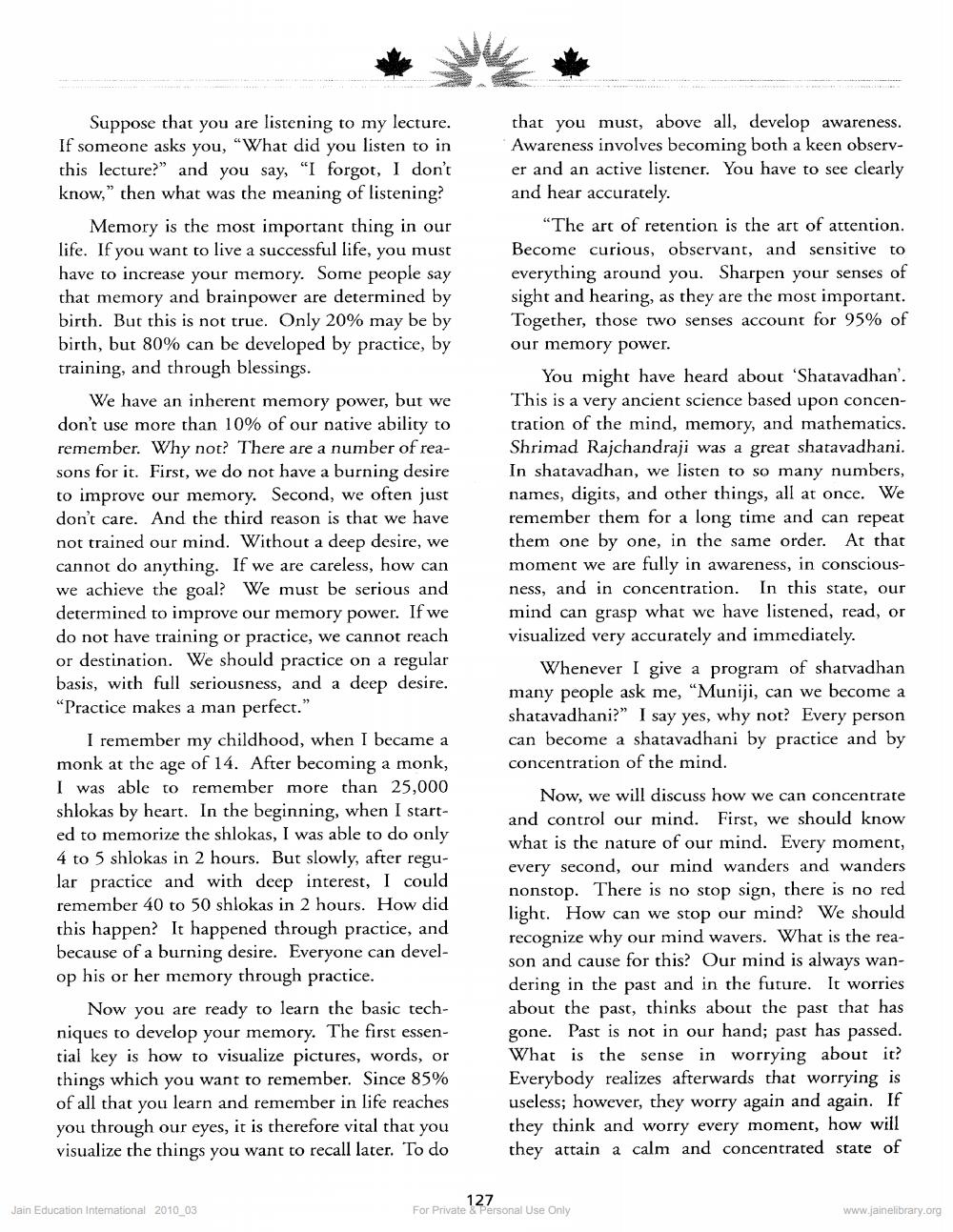________________
Suppose that you are listening to my lecture. If someone asks you, "What did you listen to in this lecture?" and you say, "I forgot, I don't know," then what was the meaning of listening?
Memory is the most important thing in our life. If you want to live a successful life, you must have to increase your memory. Some people say that memory and brainpower are determined by birth. But this is not true. Only 20% may be by birth, but 80% can be developed by practice, by training, and through blessings.
We have an inherent memory power, but we don't use more than 10% of our native ability to remember. Why not? There are a number of reasons for it. First, we do not have a burning desire to improve our memory. Second, we often just don't care. And the third reason is that we have not trained our mind. Without a deep desire, we cannot do anything. If we are careless, how can we achieve the goal? We must be serious and determined to improve our memory power. If we do not have training or practice, we cannot reach or destination. We should practice on a regular basis, with full seriousness, and a deep desire. "Practice makes a man perfect."
I remember my childhood, when I became a monk at the age of 14. After becoming a monk, I was able to remember more than 25,000 shlokas by heart. In the beginning, when I started to memorize the shlokas, I was able to do only 4 to 5 shlokas in 2 hours. But slowly, after regular practice and with deep interest, I could remember 40 to 50 shlokas in 2 hours. How did this happen? It happened through practice, and because of a burning desire. Everyone can develop his or her memory through practice.
Now you are ready to learn the basic techniques to develop your memory. The first essential key is how to visualize pictures, words, or things which you want to remember. Since 85% of all that you learn and remember in life reaches you through our eyes, it is therefore vital that you visualize the things you want to recall later. To do
Jain Education International 2010_03
that you must, above all, develop awareness. Awareness involves becoming both a keen observer and an active listener. You have to see clearly and hear accurately.
"The art of retention is the art of attention. Become curious, observant, and sensitive to everything around you. Sharpen your senses of sight and hearing, as they are the most important. Together, those two senses account for 95% of our memory power.
You might have heard about 'Shatavadhan'. This is a very ancient science based upon concentration of the mind, memory, and mathematics. Shrimad Rajchandraji was a great shatavadhani. In shatavadhan, we listen to so many numbers, names, digits, and other things, all at once. We remember them for a long time and can repeat them one by one, in the same order. At that moment we are fully in awareness, in consciousness, and in concentration. In this state, our mind can grasp what we have listened, read, or visualized very accurately and immediately.
Whenever I give a program of shatvadhan many people ask me, "Muniji, can we become a shatavadhani?" I say yes, why not? Every person can become a shatavadhani by practice and by concentration of the mind.
Now, we will discuss how we can concentrate and control our mind. First, we should know what is the nature of our mind. Every moment, every second, our mind wanders and wanders nonstop. There is no stop sign, there is no red light. How can we stop our mind? We should recognize why our mind wavers. What is the reason and cause for this? Our mind is always wandering in the past and in the future. It worries about the past, thinks about the past that has gone. Past is not in our hand; past has passed. What is the sense in worrying about it? Everybody realizes afterwards that worrying is useless; however, they worry again and again. If they think and worry every moment, how will they attain a calm and concentrated state of
127
For Private & Personal Use Only
www.jainelibrary.org




